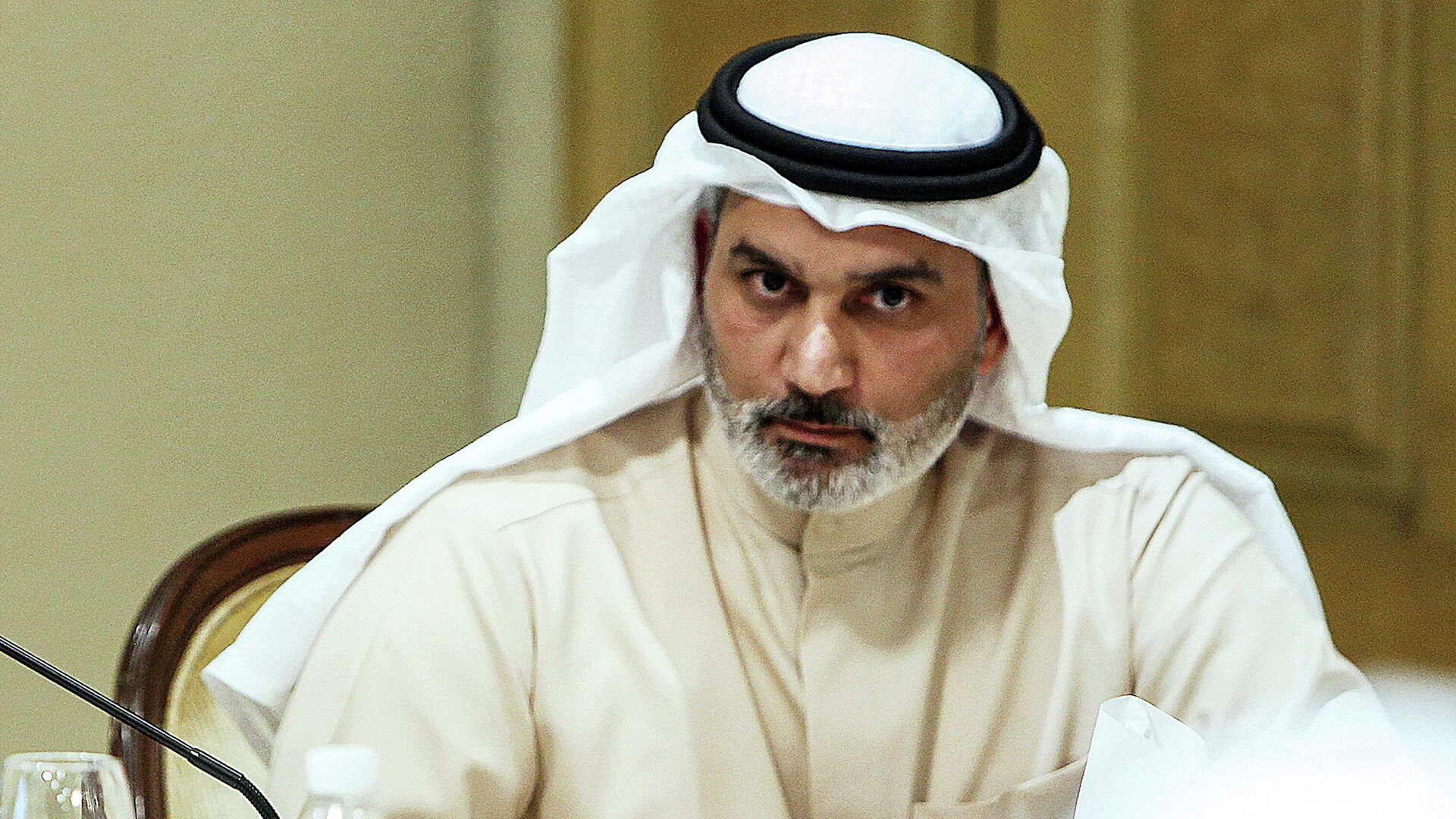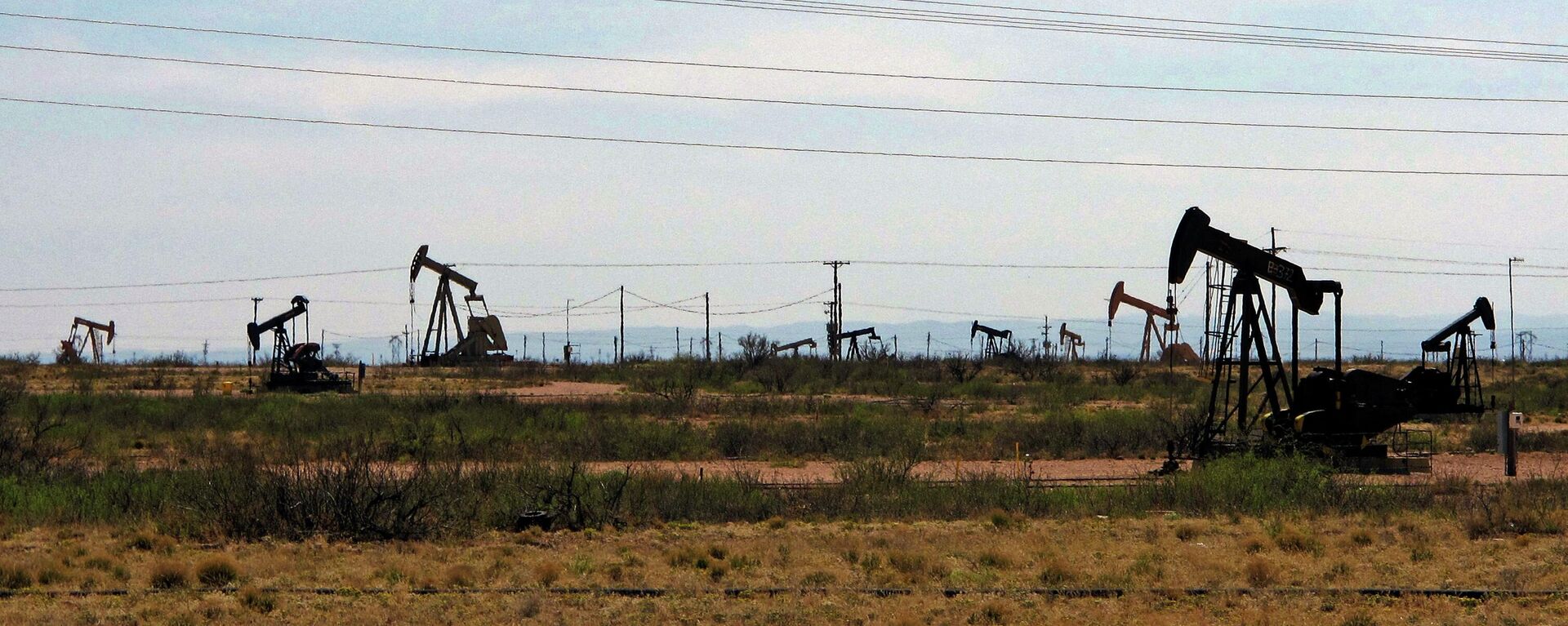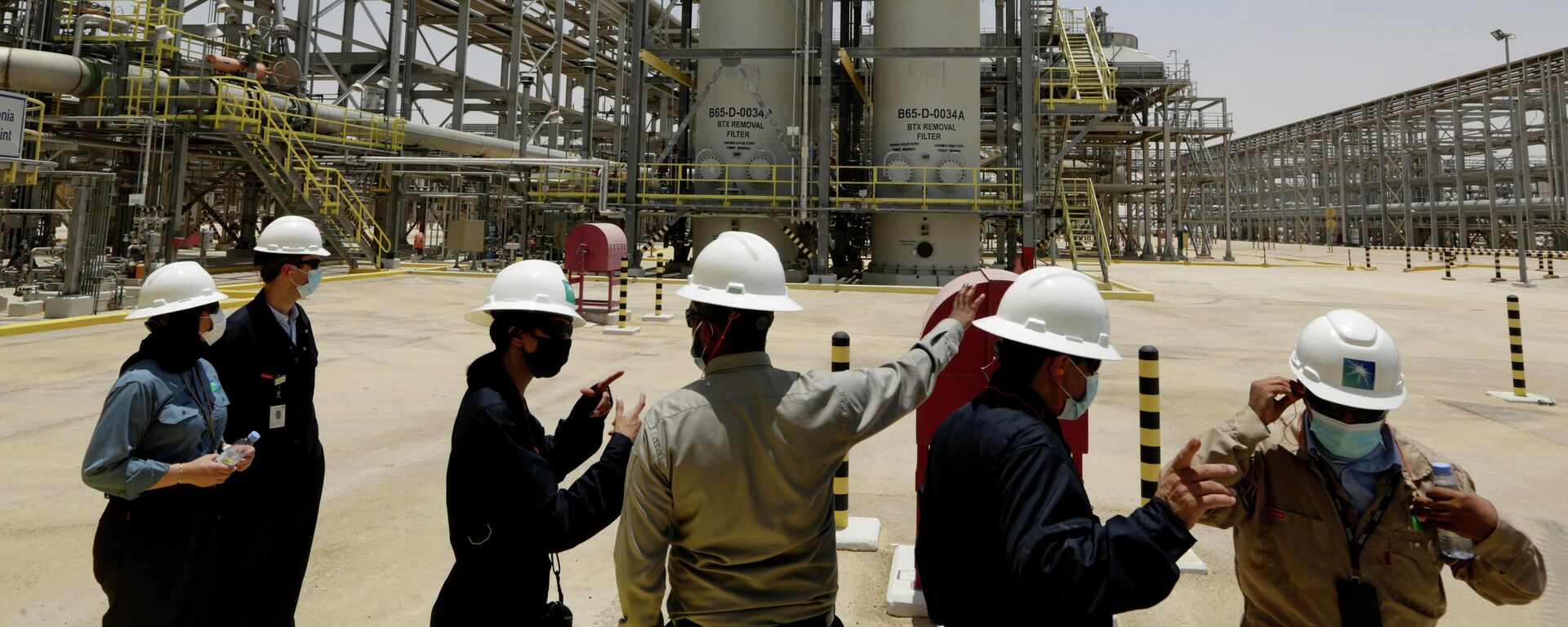https://sputnikglobe.com/20220706/born-in-kuwait-educated-in-us-worked-in-china-who-is-opecs-new-secretary-general-1097017899.html
Born in Kuwait, Educated in US, Worked in China: Who is OPEC’s New Secretary General?
Born in Kuwait, Educated in US, Worked in China: Who is OPEC’s New Secretary General?
Sputnik International
Mohammad Sanusi Barkindo, a Nigerian-born Organization of Petroleum Exporting Countries (OPEC) secretary general who helped forge the energy alliance with... 06.07.2022, Sputnik International
2022-07-06T12:51+0000
2022-07-06T12:51+0000
2022-07-06T13:38+0000
opec
mohammad sanusi barkindo
https://cdn1.img.sputnikglobe.com/img/07e6/07/06/1097011388_0:0:3000:1688_1920x0_80_0_0_cf5586cfcbcfba1e4f63c4e771d2c6da.jpg
Haitham al-Ghais, a 53-year-old Kuwaiti-born oilman with close to three decades of experience in the industry, has taken over as OPEC secretary general.Ghais was picked to succeed Mohammad Sanusi Barkindo by acclamation rather than a traditional ballot at a special OPEC meeting on January 3, with no other candidate standing for the job. He is expected to serve a three year term, with the possibility of reelection for a second (the maximum allowed under OPEC rules).Immediately before his appointment to the top OPEC post, Ghais worked as deputy director for international marketing at the Kuwait Petroleum Corporation (KPC), the sheikdom’s national oil giant producing upwards of seven percent of global crude output.Educated at the University of San Francisco, where he studied political science before graduating in 1990, Ghais began working for the KPC in 1993. He headed up the company’s regional office in Beijing, China between 2005 and 2007, and its London office from 2008-2013. He returned to Kuwait in 2014 to work in international marketing at the KPC’s headquarters in Kuwait City.Between 2017 and 2021, Ghais served as Kuwait’s governor at OPEC. In 2017, he chaired the cartel’s Joint Technical Committee, a body tasked with examining oil market conditions and developments. He remained a member of the committee until 2021.Appointment Welcomed by Gulf CountriesThe oilman is the first native of a Gulf Cooperation Council country to run OPEC since Ahmed Al-Fahad Al-Ahmed Al-Sabah, another Kuwaiti, who was the organization’s secretary general between January and December of 2005.The son of a Kuwaiti career diplomat, Ghais reportedly speaks as many as six foreign languages in addition to his native Arabic, including English, French, German, Portuguese, Spanish, and possibly Chinese.Saudi Arabia, OPEC’s de facto leader, and the United Arab Emirates welcomed Ghais’ January election, with the UAE’s Energy Minister Suhail Al Mazrouei hailing him as “our brother” and pointing to his “extensive experience in the field.”The now late Barkindo characterized Ghais as a “committed, knowledgeable and extremely able technocrat who can lead the organization in the years to come,” and indicated that he would help him adjust to the job if asked.Relationship With RussiaEnergy market observers have predicted that Mr. Ghais’ key tasks will include assuring continued cooperation between OPEC and other oil producers who are part of the so-called "OPEC Plus" alliance, chief among them Russia.In an interview with Reuters in January, Ghais assured that “support [for] the continuation of the Declaration of Cooperation,” a 2016 document on collaboration between OPEC and its "Plus" partners, would be “one of [his] top priorities.” The Kuwaiti oilman expressed confidence that his years of experience in senior OPEC posts would help him to “preserve and nurture” the cartel’s ties with Russia.In a recent interview with Energy Aspects, Ghais reiterated his support for the OPEC Plus platform, and said there were opportunities for its 23 members “to venture off into other forms of cooperation, not just the production adjustments that we’re currently doing.”Barkindo’s LegacyDuring his tenure as OPEC’s secretary general, Mohammad Sanusi Barkindo played a key role in forging the OPEC-non-OPEC oil producer alliance, and in mediating the bitter 2020 output dispute between Saudi Arabia and Russia, which temporarily sent oil futures into unprecedented negative territory in April of that year.Before his election to the top OPEC post in 2016, Barkindo was a fixture of the organization for decades, working as a member of the Nigerian delegation to the body between 1986 and 2010. During this period, he also worked as an executive with the Nigerian National Petroleum Corp, heading up the company between 2009 and 2010.Barkindo earned the ire of the United States and its European allies this spring after Russia launched its military operation in Ukraine, warning in the weeks that followed that trying to replace Russia’s seven million barrels of oil per day output was out of the question, and calling on nations to avoid holding global energy markets “hostage” to geopolitical disputes.In May, The Telegraph reported on wrangling within OPEC on whether to raise crude output, and that the bloc had no plans to ramp up production to help the West mitigate the consequences of rising energy costs sparked by sanctions against Russia.OPEC Plus has instead stuck with its commitment to a small production increase of 648,000 barrels per day by August, almost certainly less than hoped for by the Biden administration and US allies. President Biden will head to Saudi Arabia in mid-July as part of his broader Middle East tour to try to restore frayed ties with the Gulf oil kingdom.
https://sputnikglobe.com/20220706/opec-secretary-general-mohammed-barkindo-dies-aged-63-nigerian-petroleum-boss-mele-kyari-says-1097000179.html
https://sputnikglobe.com/20220629/oil-prices-up-another-2-on-signs-uae-saudi-arabia-have-maxed-out-production-1096772751.html
https://sputnikglobe.com/20220507/opec-wont-boost-oil-production-to-help-the-west-contain-rising-energy-prices---report-1095339424.html
Sputnik International
feedback@sputniknews.com
+74956456601
MIA „Rossiya Segodnya“
2022
News
en_EN
Sputnik International
feedback@sputniknews.com
+74956456601
MIA „Rossiya Segodnya“
Sputnik International
feedback@sputniknews.com
+74956456601
MIA „Rossiya Segodnya“
opec, mohammad sanusi barkindo
opec, mohammad sanusi barkindo
Born in Kuwait, Educated in US, Worked in China: Who is OPEC’s New Secretary General?
12:51 GMT 06.07.2022 (Updated: 13:38 GMT 06.07.2022) Mohammad Sanusi Barkindo, a Nigerian-born Organization of Petroleum Exporting Countries (OPEC) secretary general who helped forge the energy alliance with Russia and other non-OPEC producers in 2016, died unexpectedly on Tuesday at the age of 63, less than a month before he was to step down at the end of his term on August 1.
Haitham al-Ghais, a 53-year-old Kuwaiti-born oilman with close to three decades of experience in the industry, has taken over as OPEC secretary general.
Ghais was picked to succeed Mohammad Sanusi Barkindo by acclamation rather than a traditional ballot at a special OPEC meeting on January 3, with no other candidate standing for the job. He is expected to serve a three year term, with the possibility of reelection for a second (the maximum allowed under OPEC rules).
Immediately before his appointment to the top OPEC post, Ghais worked as deputy director for international marketing at the Kuwait Petroleum Corporation (KPC), the sheikdom’s national oil giant producing upwards of seven percent of global crude output.
Educated at the University of San Francisco, where he studied political science before graduating in 1990, Ghais began working for the KPC in 1993. He headed up the company’s regional office in Beijing, China between 2005 and 2007, and its London office from 2008-2013. He returned to Kuwait in 2014 to work in international marketing at the KPC’s headquarters in Kuwait City.
Between 2017 and 2021, Ghais served as Kuwait’s governor at OPEC. In 2017, he chaired the cartel’s Joint Technical Committee, a body tasked with examining oil market conditions and developments. He remained a member of the committee until 2021.
Appointment Welcomed by Gulf Countries
The oilman is the first native of a Gulf Cooperation Council country to run OPEC since Ahmed Al-Fahad Al-Ahmed Al-Sabah, another Kuwaiti, who was the organization’s secretary general between January and December of 2005.
The son of a Kuwaiti career diplomat, Ghais reportedly speaks as many as six foreign languages in addition to his native Arabic, including English, French, German, Portuguese, Spanish, and possibly Chinese.
Saudi Arabia, OPEC’s de facto leader, and the United Arab Emirates welcomed Ghais’ January election, with the UAE’s Energy Minister Suhail Al Mazrouei
hailing him as “our brother” and pointing to his “extensive experience in the field.”
The now late Barkindo characterized Ghais as a “committed, knowledgeable and extremely able technocrat who can lead the organization in the years to come,” and indicated that he would help him adjust to the job if asked.
Energy market observers have
predicted that Mr. Ghais’ key tasks will include assuring continued cooperation between OPEC and other oil producers who are part of the so-called "OPEC Plus" alliance, chief among them Russia.
In an
interview with Reuters in January, Ghais assured that “support [for] the continuation of the Declaration of Cooperation,” a 2016
document on collaboration between OPEC and its "Plus" partners, would be “one of [his] top priorities.” The Kuwaiti oilman expressed confidence that his years of experience in senior OPEC posts would help him to “preserve and nurture” the cartel’s ties with Russia.
In a recent interview with Energy Aspects, Ghais reiterated his support for the OPEC Plus platform, and
said there were opportunities for its 23 members “to venture off into other forms of cooperation, not just the production adjustments that we’re currently doing.”
During his tenure as OPEC’s secretary general, Mohammad Sanusi Barkindo played a key role in forging the OPEC-non-OPEC oil producer alliance, and in mediating the bitter 2020 output dispute between Saudi Arabia and Russia, which temporarily
sent oil futures into unprecedented negative territory in April of that year.
Before his election to the top OPEC post in 2016, Barkindo was a fixture of the organization for decades, working as a member of the Nigerian delegation to the body between 1986 and 2010. During this period, he also worked as an executive with the Nigerian National Petroleum Corp, heading up the company between 2009 and 2010.
Barkindo earned the ire of the United States and its European allies this spring after Russia launched its military operation in Ukraine, warning in the weeks that followed that trying to replace Russia’s seven million barrels of oil per day output was
out of the question, and calling on nations to avoid holding global energy markets
“hostage” to geopolitical disputes.
In May, The Telegraph
reported on wrangling within OPEC on whether to raise crude output, and that the bloc had no plans to ramp up production to help the West mitigate the consequences of rising energy costs sparked by sanctions against Russia.
OPEC Plus has instead stuck with its commitment to a small production increase of
648,000 barrels per day by August, almost certainly less than hoped for by the Biden administration and US allies. President Biden will head to Saudi Arabia in mid-July as part of his broader Middle East tour to try to
restore frayed ties with the Gulf oil kingdom.




